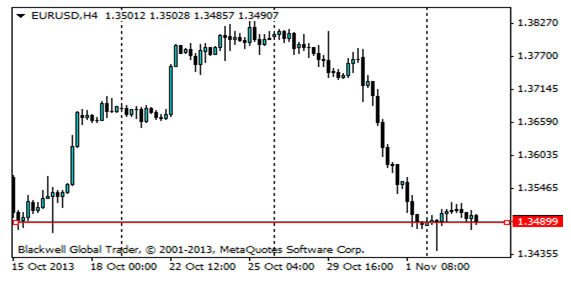Currently, the EUR/USD is experiencing a downtrend. The currency pair has depreciated by over 300 pips in the past week, aswe are witnessing a sell-off in risk appetite currency pairs.
Now the US government issues have concluded, confidence in the USD is slowly strengthening. This has deteriorated the value of the EUR/USD.
Right now, the EUR/USD has approached support line resistance, providing an attractive opportunity to either buy, or sell the currency pair. EUR/USD H4" title="EUR/USD H4" height="296" width="571">
EUR/USD H4" title="EUR/USD H4" height="296" width="571">
In my opinion,it is not too late to go “short” on the EUR/USD. Below are some of the reasons why.
Potential interest rate cut
Last Thursday, Eurozone inflation recorded a four year low, with inflation falling to 0.7%. This is far below the ECB’s 2.0% target and there is now a fear that the ECB may look to cut their interest rates, to further stimulate the EU economy.
The next ECB interest rate decision is this coming Thursday, 7th November.
In all likelihood, the possibility of cutting the interest rates this monthis slightly premature, however it is possible there could be an indication of an interest rate adjustment in the foreseeable future. This would lower confidence in the EU economy and decrease the value of the EUR/USD.
ECB president, Mario Draghi has previously stated a strong EUR could adversely affect the EU recovery. He may use his speechthis Thursdayas the optimum opportunity to sound dovish and awake the bears.
Troublesome unemployment rates
According to Eurostat, the unemployment rate within the 17-nation Eurozone has reached another record high. Unemployment is now at 12.2%. What is worrying observers is that France and Italy, the second and third largest economies within the Eurozone, are witnessing increases in their unemployment statistics. The European Commission expects France and Italy’s recent unemployment surge to carry on through 2014.
Ernst and Young have indicated that unemployment in the Eurozone will remain high until either confidence is reinstalled in their banking sector, or the accessibility to money becomes easier. . The latter is what could encourage the ECB to lower their benchmark interest rates sooner rather than later.
Unemployment statistics remaining at these levels will continue to devalue the EUR/USD.
False hopes over Spanish recovery
Last week, it was revealed that Spain had exited their recession. Spain recorded their first positive GDP expansion of 0.1% after nine consecutive periods of contraction. Further optimism was created when Fitch Ratings raised their outlook for Spain from “negative” to “stable”.
However, a 0.1% GDP growth would be alarming for most western nations.Tourism is Spain’s number one service export, and this is what performed admirably in the previous quarter. It has been indicated that Spain welcomed more tourists this year, partly due to tourists avoiding countries with political unrest.
Europe’s fourth largest economy is still far from out of trouble. Their unemployment rates are still among the largest in the Eurozone, at 26%.
The IMF has previously emphasised that Spain’s unemployment rates will remain above 25% for the following five years. Fitch Ratings have stated that Spanish medium term prospects are weak, their economy remains indebted and unemployment is exceptionally high.
Finally, economic growth in Spain has been downgraded for next year. The Spanish government was expecting 0.7% expansion, but this has now been revised down to below 0.5%. .
Final thoughts
In conclusion, the above indications are presently leading towards the opinion that the recent EUR/USD downtrend could be set to continue. Any potential cut in interest rates will prove bearish for the EUR/USD, and there is a possibility that the ECB could be tempted into further reducing their lending rates.
The unemployment rates within the EU are still alarmingly high, and unemployment looks set to remain at these levels for the foreseeable future.
Finally, there must be internal anxiety over the emergence that France and Italy are recording further increases in jobless rates, while Spain is far from out of deep water. .
In my opinion, we are set to witness furtherlosses in value for the European currency.
- English (UK)
- English (India)
- English (Canada)
- English (Australia)
- English (South Africa)
- English (Philippines)
- English (Nigeria)
- Deutsch
- Español (España)
- Español (México)
- Français
- Italiano
- Nederlands
- Português (Portugal)
- Polski
- Português (Brasil)
- Русский
- Türkçe
- العربية
- Ελληνικά
- Svenska
- Suomi
- עברית
- 日本語
- 한국어
- 简体中文
- 繁體中文
- Bahasa Indonesia
- Bahasa Melayu
- ไทย
- Tiếng Việt
- हिंदी
All Eyes On The Euro Dollar
Published 11/07/2013, 01:14 AM
Updated 05/14/2017, 06:45 AM
All Eyes On The Euro Dollar
Latest comments
Loading next article…
Install Our App
Risk Disclosure: Trading in financial instruments and/or cryptocurrencies involves high risks including the risk of losing some, or all, of your investment amount, and may not be suitable for all investors. Prices of cryptocurrencies are extremely volatile and may be affected by external factors such as financial, regulatory or political events. Trading on margin increases the financial risks.
Before deciding to trade in financial instrument or cryptocurrencies you should be fully informed of the risks and costs associated with trading the financial markets, carefully consider your investment objectives, level of experience, and risk appetite, and seek professional advice where needed.
Fusion Media would like to remind you that the data contained in this website is not necessarily real-time nor accurate. The data and prices on the website are not necessarily provided by any market or exchange, but may be provided by market makers, and so prices may not be accurate and may differ from the actual price at any given market, meaning prices are indicative and not appropriate for trading purposes. Fusion Media and any provider of the data contained in this website will not accept liability for any loss or damage as a result of your trading, or your reliance on the information contained within this website.
It is prohibited to use, store, reproduce, display, modify, transmit or distribute the data contained in this website without the explicit prior written permission of Fusion Media and/or the data provider. All intellectual property rights are reserved by the providers and/or the exchange providing the data contained in this website.
Fusion Media may be compensated by the advertisers that appear on the website, based on your interaction with the advertisements or advertisers.
Before deciding to trade in financial instrument or cryptocurrencies you should be fully informed of the risks and costs associated with trading the financial markets, carefully consider your investment objectives, level of experience, and risk appetite, and seek professional advice where needed.
Fusion Media would like to remind you that the data contained in this website is not necessarily real-time nor accurate. The data and prices on the website are not necessarily provided by any market or exchange, but may be provided by market makers, and so prices may not be accurate and may differ from the actual price at any given market, meaning prices are indicative and not appropriate for trading purposes. Fusion Media and any provider of the data contained in this website will not accept liability for any loss or damage as a result of your trading, or your reliance on the information contained within this website.
It is prohibited to use, store, reproduce, display, modify, transmit or distribute the data contained in this website without the explicit prior written permission of Fusion Media and/or the data provider. All intellectual property rights are reserved by the providers and/or the exchange providing the data contained in this website.
Fusion Media may be compensated by the advertisers that appear on the website, based on your interaction with the advertisements or advertisers.
© 2007-2025 - Fusion Media Limited. All Rights Reserved.
